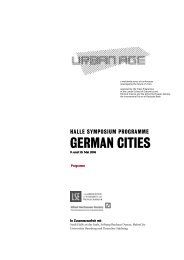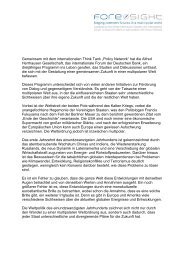Charting new directions: - Alfred Herrhausen Gesellschaft
Charting new directions: - Alfred Herrhausen Gesellschaft
Charting new directions: - Alfred Herrhausen Gesellschaft
Create successful ePaper yourself
Turn your PDF publications into a flip-book with our unique Google optimized e-Paper software.
<strong>Charting</strong> <strong>new</strong> <strong>directions</strong>: Brazil’s role in a multi-polar world 7PrefaceMarcio PochmannIn recent years, in a context of deepening democracy(where a metalworker and now a woman have beenelected president), Brazil has managed to reconcileeconomic growth with improved income distribution.Progress has been made in the modernisation ofeconomic activity, the promotion of more equitableand environmentally sustainable development andthe valorisation of citizenship. Over ten million jobswere created between 2003 and 2010, accompaniedby a significant increase in real income and minimumwage. The Brazilian state has played a strategicrole in the advancement and protection of socialsecurity. Direct income transfer programmes to poorfamilies, including Bolsa Familia (the family allowanceprogramme), the continuous benefit provision and therural pension programmes were crucial for the cycleof sustained economic growth, strengthening theinternal market and improving living conditions of thepoorest segments of society.Considerable progress has also been made inforeign relations. International reserves surpassed$300bn and Brazilian companies and banks wereinternationalised. The country now participates invarious significant international forums, such as theG20 major economies, the G20 developing nations,the Basel Committee on Banking Supervision and theFinancial Stability Board. It has also been involved in thereform of IMF and World Bank voting and governancestructures.Considering the current innovative and creativemoment in the field of ideas and public policies,the Institute of Applied Economic Research (Ipea)believes that these achievements need to be widelydiscussed, understood and improved, when pursuingthe <strong>new</strong> model of Brazilian development. 1 In termsof the design and implementation of public policies,the ongoing, collective and cumulative exercise ofdemocracy in Brazil points towards the growingmaturity of institutions. But major challenges still loomover Brazilian society.As stated by the President, Dilma Rousseff:“the economic and social gains of recent years areallowing a re<strong>new</strong>ed confidence in the future. A hugewindow of opportunity opens for Brazil. To becomean economically rich and a socially just country nolonger seems a distant goal. However, there still areenormous challenges ahead. The main ones include theprovision of quality education, the democratisation ofknowledge and a form of development which respectsthe environment. Prioritising education implies theconsolidation of universal values of democracy,freedom and tolerance, ensuring opportunities forall. We are making the right choices: Brazil combinesthe effective reduction of social inequalities with itsinsertion as a leading environmental, economic andcultural power”. 2The population’s full social inclusion depends onuniversalising and improving the quality of essentialpublic services, particularly health, education andsafety. President Dilma Rousseff, in her inaugural1 The Institute for Applied Economic Research (Ipea) has made an enormous effort to understand the main characteristics of this “<strong>new</strong> cycle of Braziliandevelopment,” based on the expansion of the domestic market, the reduction of poverty and income inequality, expanding popular participation andintensifying international insertion by means of the project Perspectives of the Brazilian Development, which articulates a comprehensive set ofstudies, called “Core Themes for Development”. All these documents are available on Ipea’s website (http://www.ipea.gov.br).2 Rousseff, Dilma. “País do conhecimento, potência ambiental”, Folha de S.Paulo, São Paulo, 20 February 2011, p.A3..Preface | Marcio Pochmann








